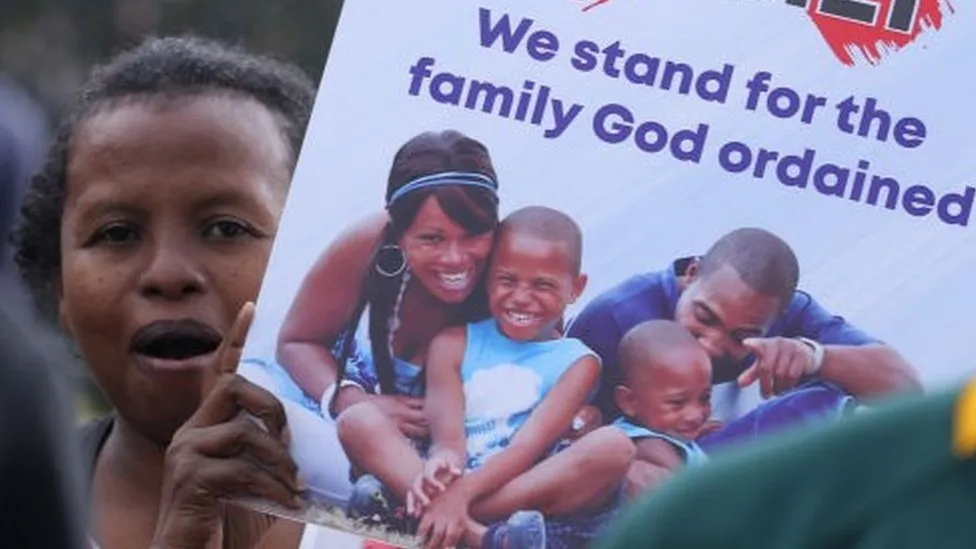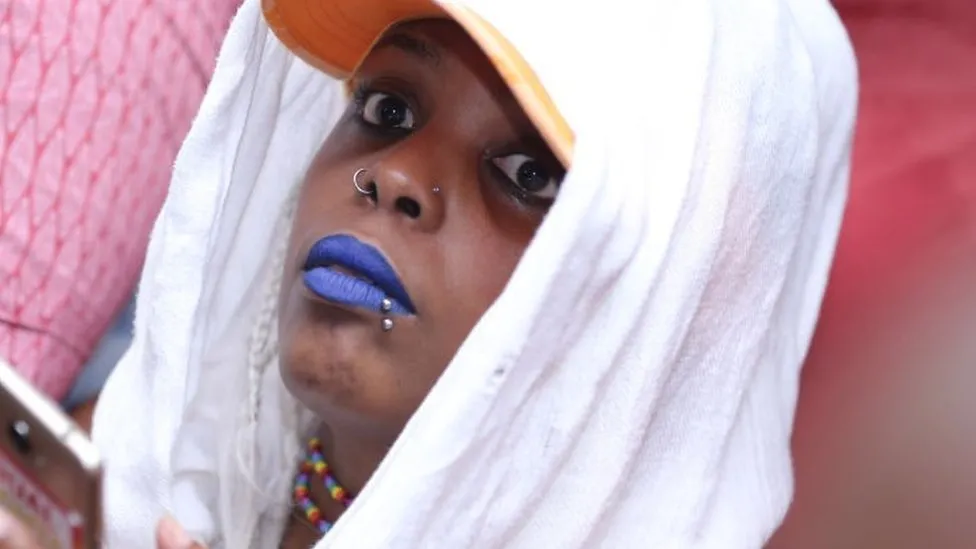LGBT rights in Africa: Will Kenya be the latest to pass anti-gay law?
BBC News, Nairobi
In the latest sign of rising homophobia in different African countries, a Kenyan opposition MP is leading a campaign for parliament to further criminalise the country's small LGBTQ community.
George Peter Kaluma's move comes after neighbouring Uganda adopted a tough new anti-gay law, rejecting threats by US President Joe Biden to impose sanctions and travel restrictions on "anyone involved in serious human rights abuses".
When I met Mr Kaluma - a member of veteran Kenyan opposition politician Raila Odinga's Orange Democratic Movement - he was sitting behind his desk at his office in the capital Nairobi, proof-reading and making corrections to a bill that he intends to table in parliament soon.
"We want to prohibit everything to do with homosexuality," Mr Kaluma tells me, adding that his bill will be much broader than the legislation passed by Uganda's parliament and approved by President Yoweri Museveni in May.
The Ugandan law is regarded as one of the harshest anti-LGBTQ laws in the world.
It proposes life imprisonment for anyone convicted of homosexuality, and the death penalty for so-called aggravated cases, which include having gay sex with someone below the age of 18 or where someone becomes infected with a life-long illness such as HIV.
On the other side of the continent, MPs in Ghana earlier this month unanimously voted in favour of amendments to the country's anti-gay legislation, pushing it closer to being enacted into law. Though less harsh than Uganda's new law, the Promotion of Proper Human Sexual Rights and Ghanaian Family Values Bill proposes a three-year prison sentence for anyone who identifies as LGBTQ and a 10-year sentence for anyone who promotes homosexuality.
So why are different African countries proposing anti-LGBTQ measures at the same time? Some think that US evangelical groups may be playing a role by pushing their agenda on the continent.
In a trip that Mr Kaluma says was paid for by Kenya's parliament, he attended a meeting of the newly created African Interparliamentary Forum on Family Values and Sovereignty held in Uganda in March.
Lawmakers, religious leaders and campaigners from more than 20 African states participated, sharing ideas on how to tackle what they see as threats to conservative religious and social values.
"The bill will propose a total ban on what the West calls sex-reassignment prescriptions and procedures, and prohibit all activities that promote homosexuality, in terms of... gay parades, drag shows, wearing the colours, the flags, the emblems of the LGBTQ group," Mr Kaluma says.
Gay sex is already illegal in Kenya, but the government can also be tolerant of gay people - for example, it has given asylum to people from other African countries, including Uganda, who faced persecution in their home countries because of their sexual orientation.
Mr Kaluma tells me he wants their asylum to be revoked, and for them to leave Kenya.
At a small, hidden church set up to offer comfort and support to LGBTQ people in central Nairobi, the female pastor says Mr Kaluma's bill is causing "a lot of panic, anxiety, fear". The pastor and members of the church ask that we keep them anonymous because they say they have faced numerous security threats since it was established about 10 years ago.
She believes the proposed legislation will increase violence against them. "It gives power to anybody that would want to do something to the queers. It fuels some kind of violence that now people are planning but holding back on," she tells me.
 |
| Many Kenyans believe that gay rights are against their religion - whether Christian or Muslim |
lthough the meeting in Uganda was billed as an attempt to protect the "sovereignty" of African states, it was actually co-sponsored by an American Christian right-wing organisation, Family Watch International (FWI).
Dr Kapya Kaoma, a Zambian priest in the Anglican Church and an academic at Boston University in the US, says African countries are being targeted by FWI and similar US-based organisations, and that the impact of its lobbying has been "horrible and inhumane" in parts of Africa, fuelling what he calls "militant homophobia".
"It is one thing to say: 'I don't agree with you being gay', but we didn't have the militant one, where politicians now are saying: 'You go to jail for life, you go to jail for talking about being gay, you go to jail because you're living with your fellow woman'," Dr Kaoma says.
FWI's Mormon founder Sharon Slater denies that the group promotes anti-gay laws in Africa.
"Family Watch opposes legislation that penalises a person for having sexual attractions or for how they identify," she says in an emailed response to the BBC.
Mrs Slater addressed African lawmakers, clerics and campaigners at their forum in Uganda's lakeside city of Entebbe in March, and later appeared in a group photo with President Museveni at his official residence.
For more than 20 years, Mrs Slater has lobbied governments on what she calls "family values" and has made it her mission to campaign against children and young people being given Comprehensive Sexuality Education (CSE), a curriculum-based sex education programme championed by the United Nations and other organisations.
She cites a United Nations Population Fund (UNFPA) manual for out-of-school youths in east and southern Africa, saying it promotes homosexuality and is too explicit.
"It desensitises children to sex," she says.
Mrs Slater also quotes from the manual, including lines which say that facilitators of lessons should have "a neutral, accepting attitude towards homosexuality".
When I contact Maria Bakaroudis, UNFPA's CSE specialist for east and southern Africa, for comment, she says she is not keen to talk about the "opposition", as she refers to FWI.
She adds that the manual is only a guideline, and each country can tailor it to suit their context.
Ms Bakaroudis defends CSE, saying it provides "life-saving information" to curb high rates of unintended pregnancies, HIV, and sexually transmitted diseases.
Source

Comments
Post a Comment